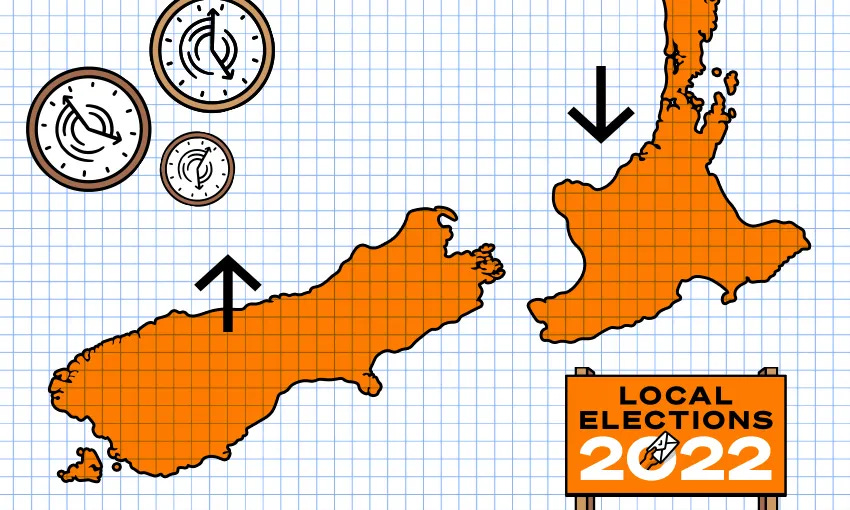What should the population of New Zealand be?
A fork in the road appears for New Zealand as views on population growth and pandemic recovery diverge
In today’s edition: government set to force supermarkets to supply rivals; Gaurav Sharma now facing expulsion from party; Trevor Mallard to formally step down today; but first, the immigration conundrum.
How big should New Zealand be? (Getty Images)
What should we call the current state of immigration affairs?
Many nouns have made an appearance after the word immigration in government announcements and commentary. We’ve had an immigration reset and an immigration rebalance recently. Bernard Hickey has called Sunday’s announcement of changes to the settings for short-term migrants, a backslide. As an everyday woman on the street who can see we have workforce shortages, a problem with economies of scale, a problem with a reliance on low-wage migrant labour, a problem with productivity and a $104b infrastructure deficit, I’m running with immigration conundrum. Ultimately the question is how big should New Zealand be and how do we accommodate that?
A population of nine million?
Newsroom Pro’s Jono Milne has talked to a few people to ask them exactly that question. Some have even been willing to take a punt. Kirdan Lees of consultancy firm Sense Partners doesn’t want politicians or bureaucrats setting population targets but believes that if you opened up immigration settings fully, the market would determine that the population would grow by four million in 10 years. As Milne writes, last week's Reserve Bank monetary policy statement indicated more immigration would help address workforce shortages, which it says is impeding economic growth and contributing to inflation. I linked to this on Monday but Liam Dann (paywalled) at the Herald agrees.
It’s hard to go cold turkey on low-wage labour
In Hickey’s piece on the Spinoff this morning he says we’re “discovering all over again how hard it is to go cold turkey on our economy’s addictions to imported low-wage labour and leveraged-and-tax-free gains on residential land price appreciation”. He is scathing of what he sees as the government reversing course on one of its main economic policies. He’s referring to Sunday’s announcement where exemptions to the median wage minimum for temporary work visa holders were extended, 102 days after May’s “immigration rebalance”. Newsroom’s Matthew Scott also covers concerns about that and outlines how it's at odds with the Productivity Commission recommendations, also made in May.
An endless three point turn
The immigration rebalance was announced ahead of a Productivity Commission report. That report concluded that immigration doesn't threaten jobs for New Zealanders but public infrastructure has not kept up with population growth. The commission also recommended that the government create a policy statement on immigration. That’s due this year. The Infrastructure Commission also presented an infrastructure strategy to the government in May. At the time finance minister Grant Robertson said closing our infrastructure gap would cost $31b over 30 years. Economic growth is impeded by a lack of in-bound migration. More migration is impeded by a lack of infrastructure. Infrastructure investment is impeded by a lack of economic growth. There’s a scene from Austin Powers in my head right now in which Powers finds himself stuck in a real conundrum. You could play it on a loop.
The Spinoff Members is a community dedicated to supporting our work. You've heard from a few of our members this month on what inspired them to join.
Whatever it is about The Spinoff that you value most, know that every dollar donated will go towards making that happen and ensuring The Spinoff remains free to all. Join now.
Thanks to Jodi, Ian, Ben and Aaron for their kind words and to all our members for their continued support – we wouldn’t be here without you.
Announcement on supermarket regulation set for today
Another pick up from Monday’s piece by Stuff’s Luke Malpass. Malpass indicated that there would be an announcement on supermarket sector regulation this week. That has come to pass and Stuff’s Tom Pullar-Strecker has the news this morning that the government is expected to announce today that it will make a law change forcing supermarket groups Countdown and Foodstuffs to wholesale groceries to rival retailers. Competition advocate and Monopoly Watch spokesman Tex Edwards have previously invoked the classics, describing any such move as a “pyrrhic victory’, named for King Pyrrhus who suffered heavy losses in victory against the Romans.
Guarav Sharma expelled from Labour caucus, Brian Tamaki announces political party
Somehow these two things ended up crossing streams yesterday so I thought I’d just round it all up for you. The Freedom and Rights coalition protest thankfully passed without serious incident. The “people’s court” sat and as Toby Manhire writes, the least surprising verdict imaginable was handed down. Brian Tamaki announced that he is forming an umbrella party made up of three other parties. The Outdoors party has since said Tamaki jumped the gun and they are not yet standing under his umbrella. Tamaki spoke after the news about Gaurav Sharma being expelled from the Labour caucus broke, and he subsequently invited Sharma to call him. Sharma is now an independent MP and his actions have been referred to the Labour party's governing council which will decide whether to expel him from the party. Audrey Young (paywalled) writes that Sharma will become “a footnote in history”.
Speaker Trevor Mallard to formally step down today
Something of a Dr Sharma multiverse yesterday, as the Herald’s Thomas Coughlan reports. I feel like I’m standing in front of a board covered in interconnected string and some mugshots explaining this but bear with (or just read Coughlan). During question time yesterday, National attempted to get another question time and debate added this week. It’s thought National were considering giving Sharma one of its spots to speak. Sharma would be protected by parliamentary privilege, meaning he could make defamatory statements without being liable for what he said. Mallard will formally step down as Speaker today and is off to Ireland. Such are the formalities of parliament that it adjourns for a day after a new Speaker is elected, meaning the debate and question time for today are cancelled, hence National’s motions to get additional ones allocated. The motions weren’t successful.
Click and collect
Wellington mayoral candidates open to idea of Wellington super city.
Auckland mayoral candidate now using former candidate’s digital campaign agency, bill disputed with former agency.
Plans to develop four offshore wind projects in Waikato, Taranaki and Southland.
Strawberries all year round a possibility.
First Air New Zealand plane back from its time in the desert wilderness.
Got some feedback about The Bulletin, or anything in the news? Get in touch with me at thebulletin@thespinoff.co.nz.
If you liked what you read today, share The Bulletin with friends, family and colleagues.
Voter turnout for local body elections is low across the board – but it's far lower in some regions and demographics than others. Emma Vitz looks to the data for reasons why. Charlotte Muru-Lannning talks to fish and chip shop owners from Auckland to Bluff about how they're remaining cheap and cheerful despite the cost of everything going through the roof. Tim Saunders pays tribute to the wily majesty of the working dog in an excerpt from his new memoir of life on the farm. Alex Casey offers a slam poetry expert a penny for his thoughts on The Block NZ's slam poetry competition and its jaw-dropping cash prize.
New Zealand Cricket's silence over Ross Taylor’s experience of racism
Stuff’s Mark Reason compares the responses to allegations of racism in cricket in New Zealand and England. Reason writes New Zealand Cricket has been silent, bar a single and somewhat perfunctory statement following the release of Ross Taylor’s autobiography. Taylor detailed racist locker room comments and casually racist comments, some of which came from current Black Caps. When something similar happened in England there was a government enquiry.
Should we really stop eating meat?
Today’s long read comes from Knowable Magazine and is a very reasoned assessment of the current and competing schools of thought about how much, if any, meat we should be eating if we want to avoid wrecking environmental havoc.










The article about productivity in the Sunday Times observes that “according to OECD figures, New Zealanders have to work 10.7 hours a day longer to produce the same amount as their world-leading Irish counterparts”: https://www.stuff.co.nz/business/300665457/its-no-laughing-matter-poor-productivity-affects-all-new-zealanders The Irish become highly productive after their population decreased from 5 million in 1850 to 2 million in 1960 - they have since increased the population back to 5 million and still lead the world’s productivity stakes. Surely therein lies the answer - increase NZ productivity so we don’t need to recruit more cheap unproductive labour!
It seems intuitively prudent that the Gov’t/RBNZ strategy of limiting immigration and increasing minimum wages will surely put pressure on business and farmers to invest in assets to increase productivity.It would be interesting for Spinoff to promote some discussion focusing attention on the alternative approaches to achieving higher productivity rather than on the gloom and doom relating to the shortages of low-cost labour. The opposition seems to believe NZ should continue to import cheap labour to keep wages down as a way of combating inflation. Clearly this is the reason why we have dropped down the OECD productivity ranks over the years. On the other hand the Govt’s strategy seems to be to push the wages up so as to encourage business owners invest in technology improvements. Perhaps they will also need to provide financial incentives to businesses who invest in technology that can demonstrate a significant increase in productivity.